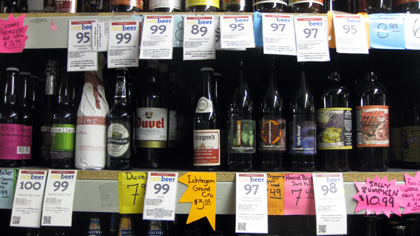ABSTRACT
You may declare that a beer sucks because it is genuinely flawed. For instance, you spot the tail of a mouse in the bottle. You might say it sucks because you’ve had the beer before and it was much better then. That’s probably not the word I’d use, but I understand. You might yell that it sucks because it isn’t too your taste. Say it’s a cucumber beer (I’ve picked on pumpkin beers enough). Now we’re talking like people who’ve maybe had a few beers.
THE BACKGROUND
Today Max takes us nicely from Point A to Point B to Point C. Before quibbling with his conclusion and providing a longer answer than fits in a comment at A Good Beer Blog, the suggested reading:
Mark Dredge is promoting a larger discussion about if using the term “craft beer” in the UK is in order. Good comments there, and further chatter in various UK blogs. But I particularly like Barm’s response at I Might Have a Glass of Beer. Beyond the fact it is simply good reading he makes it clear this is not a discussion for Americans to join in. It is about a different beer culture.
To move the conversation along, a takeaway from Dredge:
It (“craft beer”) is a suggestion that what you are getting has more investment than a hefty marketing budget; it has a heart and soul, it’s made for people who prefer taste to TV commercials.
And from Barm:
Everyone knows the beer range of the third-rate microbrewery. There’s the 5.0% boring golden ale; the 4.2% brown bitter that tastes mostly of toffee; the 3.7% session ale, suspected to be the 5.0% ale with more water in it; and the seasonal beers which are the 4.2% bitter rebadged with a lewd cartoon on the pumpclip. I don’t see any reason to dignify this stuff by labelling it “craft”; nor do I understand how, if we are to refuse it the label “craft”, we can objectively distinguish — other than by taste — between it and beers that we like better. In which case, the definition has become “beer that I like”.
Now, on to Max:
Passion could serve well as an emotional reserve when things aren’t going too well, but real success depends on other factors: proficiency, professionalism, seriousness, business talent, knowledge of the market, determination to do things well and respect for the consumer, specially for small brewers.
My quibble would be that it is passion, or conviction, that sometimes takes a beer from “better than good enough” to great. Because the brewer invests in better ingredients and better equipment.
CONCLUSION
The road to excellent beer is paved with good intentions. They are not enough.
Which takes us full circle to the question Alan asked: “Is It Fair To Say A Brewery Sucks… Or Even A Beer?” My comment: To the questions in the headline: Yes, and yes. As long as you are prepared to say why, and why you are qualified to make the judgment.
It was late, so I was thinking quite literally rather than in any philosophical sense (remember that Alan was a contributor to “Beer and Philosophy” and you never know when he’s going to go all Socrates on you). I arose this morning to this fair question: “Who is qualified? What is sucking?”
The comments that followed answer this pretty well. Most beers fall between “awesome” and “this sucks,” although we tend to overuse both of those words. And beer appreciation is subjective.
But there are objective measures, which I was referring to in my literal comment. Quality control is quality control. Were somebody to finance us we could start pulling bottles off the shelf and putting them through their paces. Any wild yeast? Buttery diacetyl (don’t shoot – not always bad)? How’s the dissolved oxygen? There are other measures, but you get the point. Not only could we say, “This beer sucks” but we’d be able to say “This one will soon.” And at some point we might decide, “This brewery sucks.”
(OK, a brewery can’t account for a consumer who buys a six-pack of beer and leaves it sitting on the sunny-side of the car on a hot day for two hours. That beer is screwed.)
It takes just as much conviction for a brewer to focus on process as stuffing “wow” in the bottle. Those are the brewers who invest in laboratory equipment, and people who understand how to use the equipment. That’s easier when a brewery is growing — or “achieving scale” — even if it makes it look a little less “crafty.”
Just to be clear, I still want the “wow” factor (well, sometimes). I’m not abandoning New Beer Rule #4. It takes something special for a brewery to make great beer decade after decade. Certainly passion on the part of somebody. But passion goes beyond brewing great beer. It includes delivering great beer.
